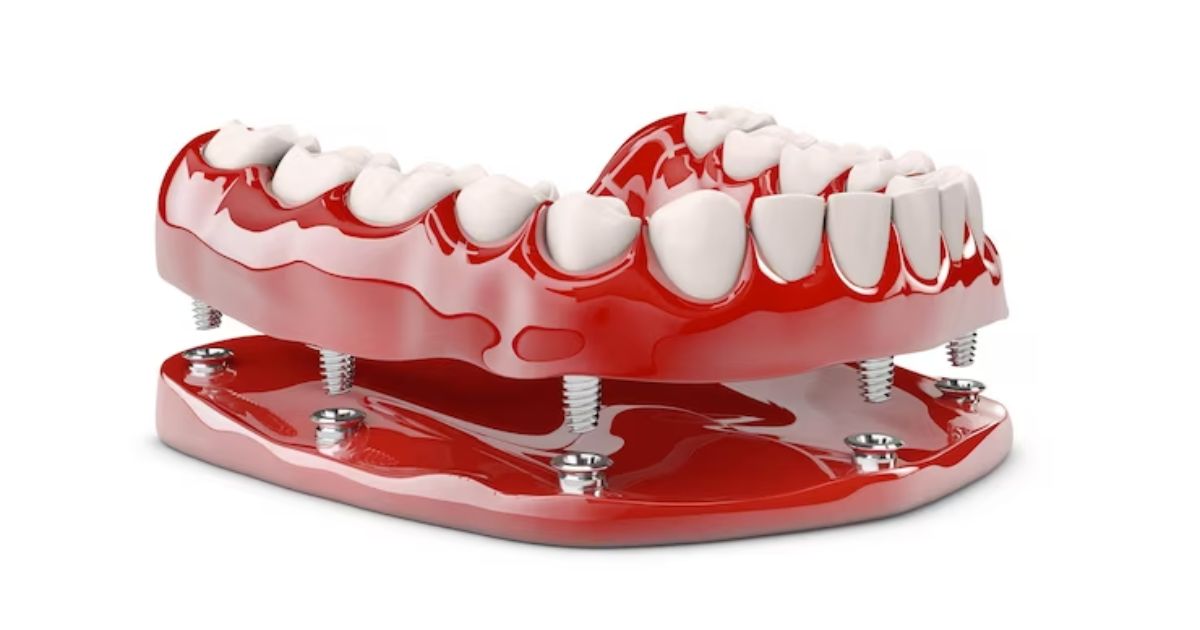A denture reline is a crucial maintenance procedure for individuals relying on dentures for oral function. Over time, the tissues in the mouth undergo changes, leading to alterations in the fit of dentures. This natural process, accompanied by bone resorption and gum tissue changes, can cause discomfort, instability, and even sores.
A denture reline addresses these issues by readjusting the inner surface of the denture to better conform to the changing contours of the mouth. This procedure involves reshaping the base of the denture to ensure a snug and comfortable fit, enhancing both function and comfort.
There are different types of relines, including hard and soft relines, catering to various needs based on the individual’s oral condition. Regular evaluations by a dental professional are essential to determine when a denture reline is needed. Properly fitted dentures not only improve comfort but also support better speech, chewing ability, and overall oral health.
Types of Denture Relines: Exploring Your Options
Types of Denture Relines: Exploring Your Options
Denture relines are tailored to suit varying needs and oral conditions. Understanding the types of relines available can assist in choosing the most suitable option.
Soft Relines
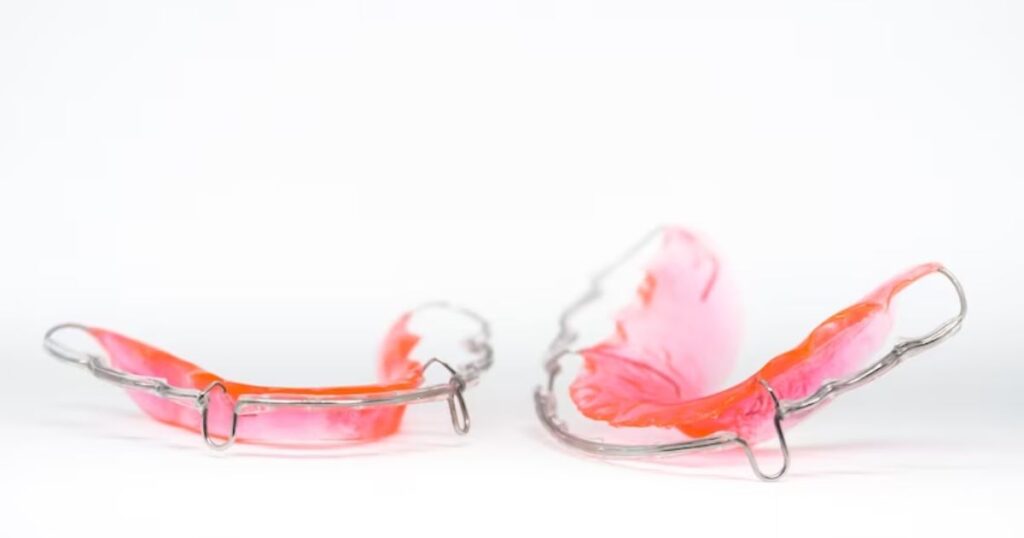
Soft relines in dentistry involve using flexible materials to modify the base of dentures, enhancing comfort and fit. Unlike hard relines, which use durable materials, soft relines offer a more cushioned feel, ideal for sensitive gum tissues or individuals experiencing discomfort.
This type of reline adapts to changes in the jawbone structure, providing a snug and comfortable fit. Soft relines are known for their pliable nature, offering relief from sore spots and ensuring a more pleasant denture-wearing experience for those seeking added comfort and flexibility in their prosthetics.
Hard Relines
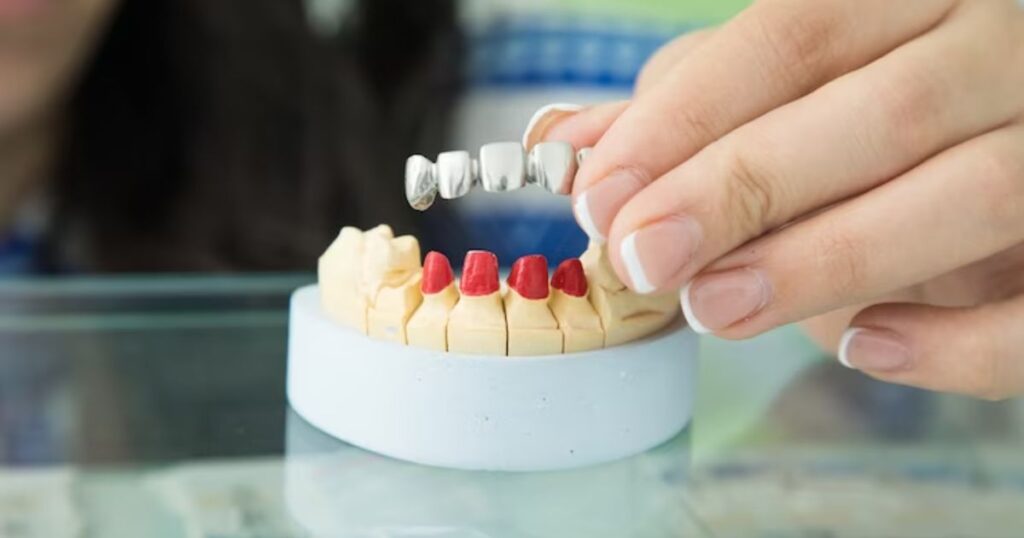
Hard relines in dentistry involve modifying the base of dentures using a durable material to enhance their fit and comfort. This type of reline is crucial when the jawbone structure changes, ensuring a snug fit and better functionality of the dentures. Hard relines provide long-lasting solutions, offering stability and durability to the prosthetics.
Dental professionals carefully assess the fit, make adjustments, and use resilient materials that contribute to the denture’s extended usability. Patients often appreciate hard relines for their ability to provide a more robust and enduring solution compared to softer materials.
Temporary Relines
Temporary relines serve as interim solutions for ill-fitting dentures. These relines utilize a softer material, providing short-term comfort while awaiting a more permanent adjustment. They offer immediate relief from discomfort, addressing sore spots or looseness in dentures.
However, temporary relines don’t provide the longevity of professional relining and may require more frequent adjustments. While they offer a quick fix, they’re not a substitute for professional dental care. Temporary relines serve as stopgap measures, allowing individuals to maintain some level of comfort before seeking a more comprehensive and precise long-term solution.
Chairside Relines vs. Lab Relines
Chairside relines and lab relines are distinct approaches in denture maintenance. Chairside relines occur within the dental office, offering immediate solutions. Using chairside relines, adjustments are swiftly made to the denture’s fitting, addressing immediate discomfort. In contrast, lab relines involve sending the denture to a dental laboratory for adjustments, often taking a few days to complete.
While chairside relines provide quick fixes, lab relines ensure precise adjustments through meticulous craftsmanship. The choice between the two depends on the urgency of adjustment and the level of precision required for optimal denture comfort and functionality.
Understanding these options allows individuals to work closely with their dentist to choose the most appropriate denture reline for their specific needs.
What Is The Process Of Getting A Denture Reline?
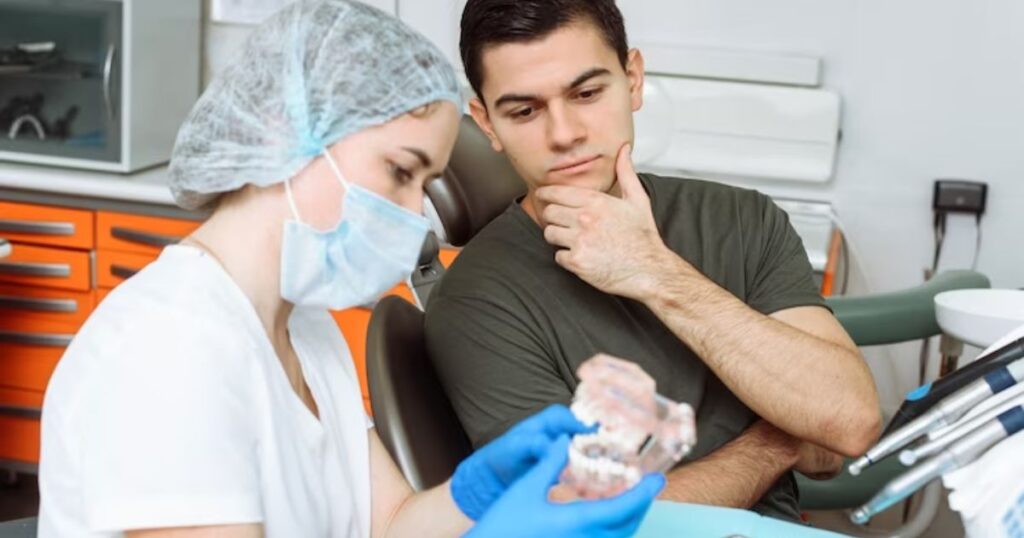
The process of getting a denture reline involves the following steps:
- Consultation and measurement: Your dentist will examine your mouth and assess the fit of your current dentures. This can be done with either soft or hard liners, depending on your needs and preferences.
- Preparation: Your dentist will clean the denture before sanding away a small amount of material on the plate. If you have mouth sores, it might be necessary to wear a temporary denture to give your mouth a chance to heal.
- Relining process: There are two types of denture relining procedures: soft and hard.Soft reline
- Fitting and adjustment: Once the new lining is ready, it will be fitted to your denture and adjusted to ensure a comfortable and secure fit.
The frequency of needing a reline will depend on several factors, including the type of denture, the kind of reline needed, and individual circumstances. Generally, it’s recommended that hard relines last longer than soft ones1. With proper care, relined dentures should last for many years before needing to be replaced
Signs It’s Time for a Denture Reline: Key Indicators
Recognizing signs indicating the need for a denture reline is crucial for maintaining oral comfort. Sore spots, difficulty chewing, or a loose fit are common indicators that a denture reline might be necessary.
Changes in speech patterns or an altered bite alignment are also key signals. Regular evaluations, especially if discomfort arises, ensure timely adjustments to prevent further discomfort or oral health issues. Identifying these signs promptly allows for proactive measures, ensuring that dentures continue to fit snugly, enhancing both comfort and functionality.
Denture Reline Procedure: Step-by-Step Overview
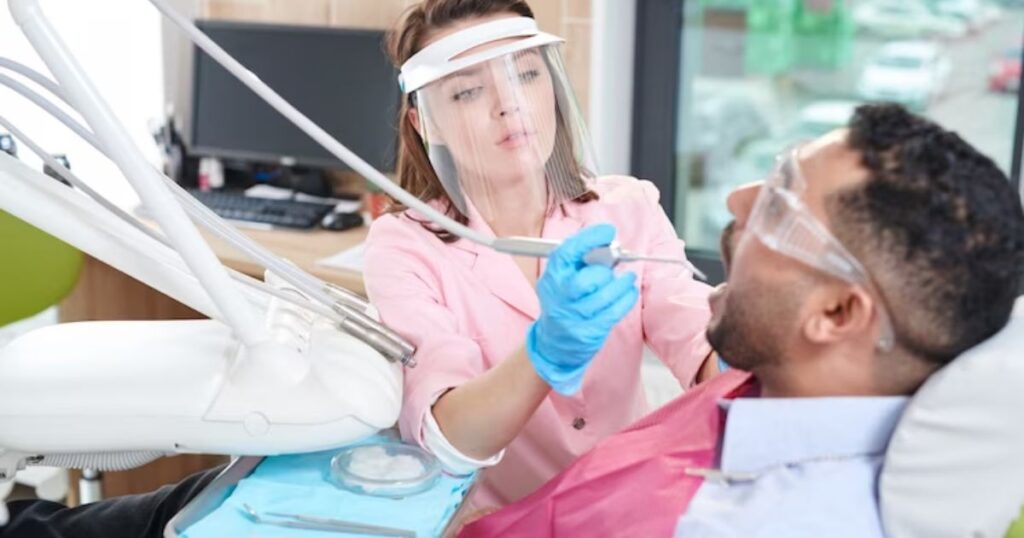
The denture reline procedure involves several key steps to ensure a precise and comfortable fit. Initially, the dentist takes impressions of the mouth using a putty-like material, capturing the current shape and contours. These impressions serve as a mold for the new denture lining.
Next, the existing denture is cleaned thoroughly before a new layer of specialized resin or material is applied to the inner surface. This material is then placed onto the denture and adjusted to fit the mouth’s unique contours. Finally, any excess material is trimmed, and the denture is polished to achieve a smooth finish, ensuring a snug and comfortable fit for the wearer.
How Long Does A Soft Denture Reline Last?
The durability of a soft denture reline varies based on individual factors such as usage, oral conditions, and maintenance. Generally, a soft denture reline can last anywhere from one to two years.
However, this timeframe isn’t definitive and can fluctuate based on wear, changes in the mouth’s structure, and how well the dentures are cared for. Regular check-ups with a dentist can help assess the condition of the soft reline and determine if adjustments or a replacement are necessary to maintain comfort and functionality.
DIY vs. Professional Denture Relining: Pros and Cons
Absolutely, here’s a chart outlining the pros and cons of DIY (Do-It-Yourself) versus Professional Denture Relining:
| Aspect | DIY Denture Relining | Professional Denture Relining |
| Pros | – Cost-effective | – Expertise and precision in adjustments |
| – Convenience and immediate availability | – Accurate assessment of oral condition | |
| – DIY kits readily available | – Customized solutions for individual needs | |
| Cons | – Risk of improper fitting | – Higher initial cost |
| – Potential damage to dentures | – Time-consuming process | |
| – Limited expertise and precision | – Dependency on dental appointments for adjustments and evaluations |
DIY relining kits may offer cost-saving benefits and immediate availability but come with risks of improper fitting and potential damage to dentures due to limited expertise. Professional denture relining involves higher initial costs and dependence on dental appointments but ensures expert assessment, customized solutions, and precise adjustments for better long-term comfort and oral health.
Cost Considerations for Denture Relining
Cost considerations for denture relining encompass various factors impacting expenses. Professional relining costs typically range from $200 to $500 per arch, influenced by location, dentist expertise, and the type of reline required (soft, hard, temporary).
Dental insurance may cover a portion of these expenses, reducing out-of-pocket costs. DIY kits, cheaper initially (around $20 to $50), seem cost-effective, but potential damage or incorrect fittings might lead to pricier repairs or replacements later.
Choosing professional services ensures precision and long-term effectiveness, potentially minimizing additional costs linked to poorly fitted or damaged dentures, emphasizing the value of investing in quality care.
FAQ’s
What is relining technique for dentures?
Relining: It is the procedures used to resurface the tissue-side of a denture with new material layer, thus producing an accurate adaptation to the denture foundation area.
Is it safe to reline dentures?
You can, but it is never recommended or advisable to reline dentures yourself. There are specific reasons for relining ill-fitting dentures and there are certain situations where a reline is not going to solve the problem. Only a dental professional can examine your unique situation and advise you accordingly.
How many times can you reline a denture?
But on average, you can expect to have a denture reline every year or two. If you’ve just recently been fitted for dentures, you may require several relines during the first few weeks as you settle into your new prosthesis. Simply stated, you should see your dentist for a reline anytime your denture feels loose.
Conclusion
In the realm of denture care, the significance of regular maintenance, particularly denture relining, cannot be overstated. This crucial procedure ensures not only comfort but also sustains oral health and functionality. Denture relining, whether soft or hard, addresses the natural changes in the mouth, preserving the accurate fit of dentures over time.
By adapting to shifting contours, relines alleviate discomfort, prevent oral issues, and extend the prosthetic’s lifespan. Opting for professional services, despite the initial cost, proves invaluable due to precision, customized solutions, and long-term effectiveness.
Regular evaluations by dental professionals remain pivotal, guiding individuals on when relines are necessary, safeguarding against potential complications, and emphasizing the holistic benefits and affordable implant dentures cost of investing in quality denture care.
